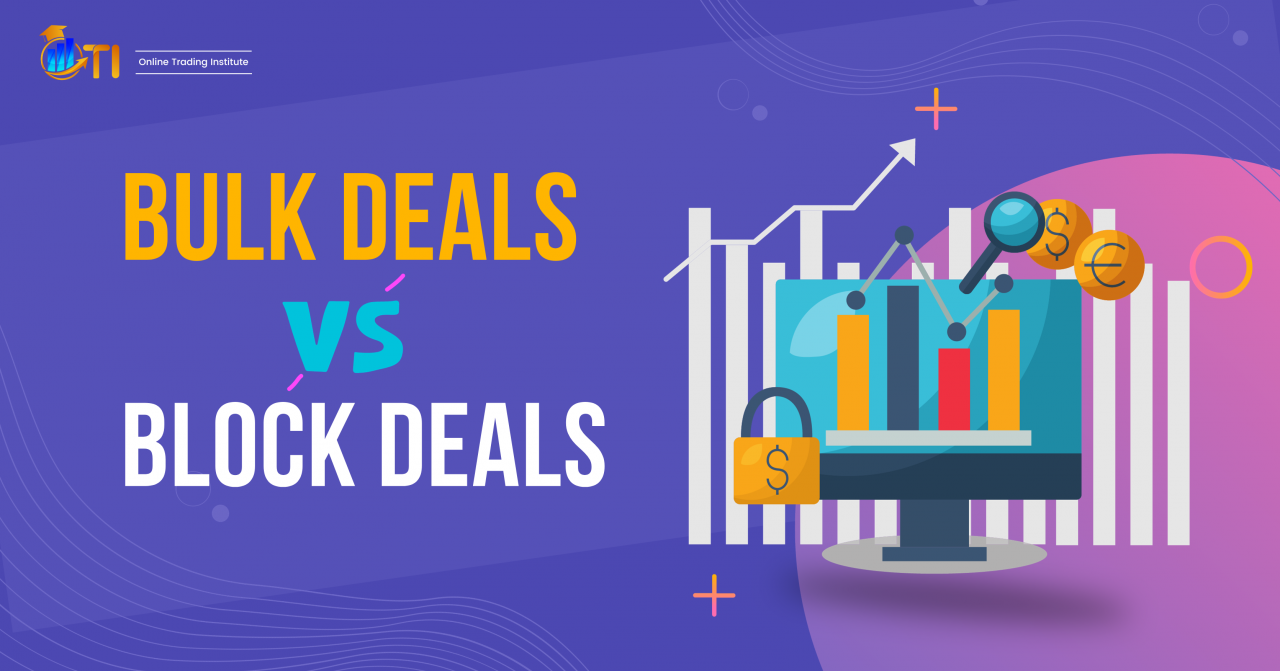So many transactions take place in the stock market on a daily basis influencing stock prices and overall market sentiment. Among these transactions, there are two certain terms that come up, which are ‘bulk deals’ and ‘block deals’.
These terms symbolise large-scale stock market transactions that can have an enormous effect on stock prices and investor opinions.
In this blog, we will look at the details of Bulk Deals and Block Deals, including their definitions, effects on stock prices, and a comparison in order to understand their differences.

What are Block Deals in the Stock market?
Block Deals are transactions involving a large number of shares, typically a minimum of 5,00,000 shares or a minimum value of Rs. 5 crore, that are completed in a single trade. These transactions are defined by the sale or purchase of a large block of shares in a single transaction.
To make these kinds of deals easier, stock exchanges have a separate window known as the “block deal window,” which ensures that these trades can be carried out in a confidential and efficient manner.
Block Deals can take place between large investors, mutual funds, or affluent people. The primary goal of engaging in block deals is to execute a large trade without causing a major disruption.
Participants can use the block deal process to buy or sell a large number of shares without risking price declines linked to large orders in the regular market.
What are Bulk Deals in the Stock Market?
Bulk Deals, on the other hand, involve transactions with a large number of shares, but the amount required is lower than in Block Deals. A Bulk Deal in the Indian stock market is defined as a transaction involving at least 0.5% of a company’s total listed shares or a minimum value of Rs. 5 crore, whichever is greater.
Bulk Deals, unlike Block Deals, do not have a separate execution window and are completed during the regular trading session.
Bulk Deals can be executed by many kinds of market participants, including institutional investors, retail investors, and even company promoters.
Because they are executed within the regular trading framework, these deals, while large, do not have the same level of market impact as block deals.
Bulk Deals are reported on the stock exchange’s website on the same day as the transaction, providing market participants with transparency.
How do Bulk and Block Deals Impact the Prices?
Bulk and Block Deals can have an immense effect on stock prices, but the extent of this impact varies depending on the type of transaction.
Because of their size, Block Deals have the potential to cause significant price movements. The block deal window, on the other hand, is intended to mitigate this impact by ensuring that the transaction is executed at an average weighted price that is usually close to the prevailing market price.
This mechanism aims to keep stock prices stable and prevent excessive volatility.
Bulk Deals, on the other hand, conducted during the regular trading session, may have a more immediate impact on prices. The stock price may fluctuate depending on the size and nature of the transaction, with bigger deals causing more significant movements.
Investors closely monitor bulk transactions to assess market sentiment and decide on buying or selling interest for a specific stock.
Bulk Deal vs Block Deal
| Criteria | Block Deal | Bulk Deal |
| Minimum Quantity of Shares | 5,00,000 shares or ₹5 crore (whichever is higher) | 0.5% of all listed shares, or ₹5 crore (whichever is higher) |
| Execution Window | To execute block deals there is a separate block deal window. | Executing bulk deals is simple as they are executed on regular trading sessions. |
| Purpose | The purpose of block deals is to allow large-scale transactions with utmost confidentiality and for portfolio management. | The purpose of bulk deals is to carry out large transactions within the regular trading framework and to acquire a stake in a company. |
| Impact on Stock Prices | These deals have a potential to cause a huge impact on the stock prices. | These deals executed at regular trading sessions have immediate impact on the stock prices, but lower than block deals. |
| Participants | Its participants are institutional investors, mutual funds investors and high-income individuals. | Its participants are institutional investors, retail investors, and promoters. |
| Market Transparency | The prices and names of the trades are disclosed only once the trade is completed. | The price and names of the trades are disclosed the same day the trade is executed. |
Conclusion
Bulk and Block Deals both play major parts in the functioning of the stock market, allowing participants to execute large transactions effectively.
While Block Deals are conducted during a dedicated window to maintain confidentiality and minimise market impact, Bulk Deals are conducted during the regular trading session, providing immediate transparency but with the potential for greater price impact.
Investors and market participants must understand the differences between these two types of transactions because their implications can influence trading strategies and investment decisions.
Understanding the dynamics of Bulk and Block Deals is becoming more essential for managing the complex landscape of modern financial markets as the stock market evolves.
Get access to market news, updates and trends; follow our telegram channel @onlinetradinginstitute
| Disclaimer: The sole purpose of our financial articles is to provide you with educational and informative content. The content in these articles does not intend any investment, financial, legal, tax, or any other advice. It should not be used as a substitute for professional advice or assistance. |
